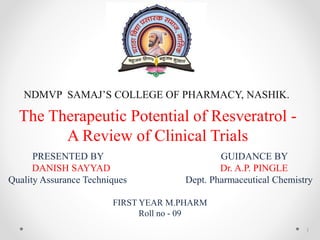The Therapeutic Potential of Resveratrol- A Review of Clinical Trials
- 1. The Therapeutic Potential of Resveratrol - A Review of Clinical Trials PRESENTED BY GUIDANCE BY DANISH SAYYAD Dr. A.P. PINGLE Quality Assurance Techniques Dept. Pharmaceutical Chemistry FIRST YEAR M.PHARM Roll no - 09 NDMVP SAMAJ’S COLLEGE OF PHARMACY, NASHIK. 1
- 2. • Sources include the skin of grapes, blueberries, raspberries, mulberries, and peanuts. • It is a Stilbenoid (C6-C2-C6) • It is a Phytoalexin • It is a Solution to French Paradox • It is a Neutraceutical
- 3. • Chemo preventive and Chemotherapeutic • Effects all 3 stages of carcinogenesis i.e. Initiation, Promotion and Progression • Induce Apoptosis pathway • Affects Nuclear factor κB (NF-κB) • Inhibits IGF-1R (hypertrophy) and activate P53 (Tumor Protein) • Inhibits phosphatidyl-inositol-3- kinase(PI3K)/Protein kinase B (Akt)/mTOR pathway
- 5. • Inhibits cyclooxygenases (COX) – anti inflammatory • Inhibits Vascular cell adhesion molecules (VCAM) that affects activity of smooth muscles cells which are responsible for the development of atherosclerosis and hypertension • Inhibits Platelet aggregation and prevent blood clot formation • Anti Aging - Activation of longevity gene (Sirtuins) Pharmacokinetics – More effective topically rather orally (quickly metabolized and excreted)
- 7. References 1. Adi Y. Berman, Rachel A. Motechin, Maia Y. Wiesenfeld and Marina K. Holz, “The therapeutic potential of resveratrol: a review of clinical Trials”, Nature precision oncology, nature publications, 1-9 (2017) 2. Chung, S. et al. Regulation of SIRT1 in cellular functions: role of polyphenols. Arch. Biochem. Biophys. 501, 79–90 (2010). 3. Magyar, K. et al. Cardioprotection by resveratrol: a human clinical trial in patients with stable coronary artery disease. Clin. Hemorheol. Microcirc. 50, 179–187(2012). 4. Paller, C. J. et al. A phase I study of muscadine grape skin extract in men with biochemically recurrent prostate cancer: safety, tolerability, and dose determination. Prostate 75, 1518–1525 (2015).
- 8. 5. Pasinetti, G. M., Wang, J., Ho, L., Zhao, W. & Dubner, L. Roles of resveratrol and other grape-derived polyphenols in Alzheimer’s disease prevention and treatment. Biochim. Biophys. Acta 1852, 1202–1208 (2015). 6. Chen, J., Bai, Q., Zhao, Z., Sui, H. & Xie, X. Resveratrol improves delayed r-tPA treatment outcome by reducing MMPs. Acta Neurol. Scand. 134, 54–60 (2016). 7. Alayev, A., Berger, S. M., Kramer, M. Y., Schwartz, N. S. & Holz, M. K. The combination of rapamycin and resveratrol blocks autophagy and induces apoptosis in breast cancer cells. J. Cell. Biochem. 116, 450–457 (2015). 8. David A. Sinclair. A conserved NAD binding pocket that regulates protein-protein interactions during aging. Science, 24 Mar 2017: Vol. 355, Issue 6331, pp. 1312-1317.








